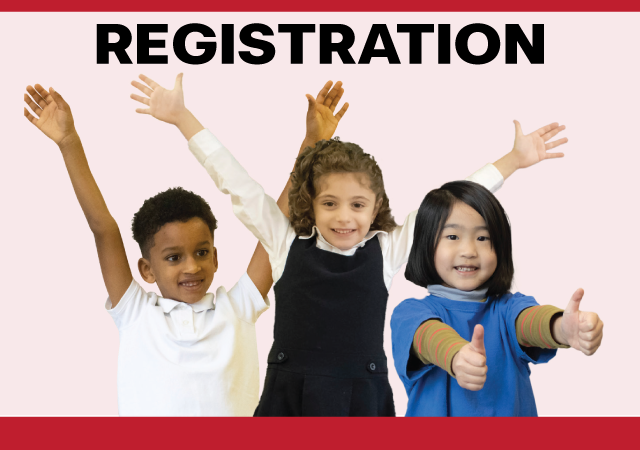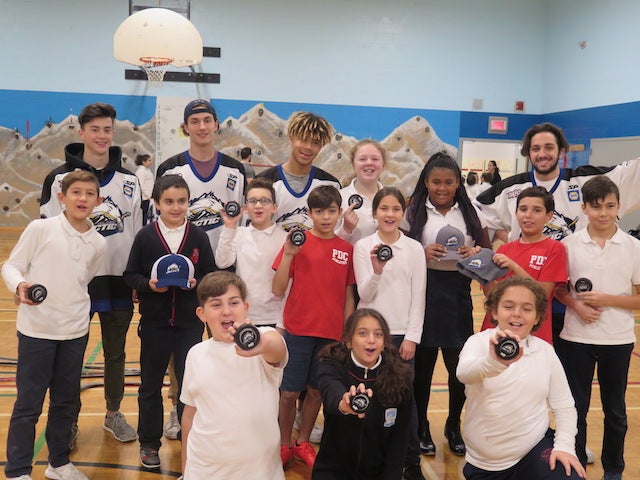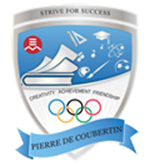The Montreal North Arctic Junior AAA team continued their “Stay in School” tour of East End EMSB schools with a visit to Pierre de Coubertin Elementary in St. Léonard.
At Pierre de Coubertin Elementary School we have four closed classrooms. These classrooms include: Welcoming, Wings JR, Wings Intermediate and Wings Senior. These classrooms allow students to get individualized support and instruction because of the smaller class size setting.
This highly structured academic program is tailored to every child’s abilities and needs. We work closely with the school team in order to strategize and set up effective teaching strategies that allow students to reach their individualized goals.
What’s amazing about our highly structured academic program is that it helps every student develop important social and life skills. These social and life skills are important because they are an essential component in fostering students’ ability to communicate which ultimately builds students' overall independence.
The Daily 5 is a literacy teaching method that creates a classroom of engaged and independent readers and writers. It’s not the “what” you teach but “how” that the Daily 5 aims to solve by creating a structure in which students participate in meaningful activities, while educators work uninterrupted with small groups and individuals.
During Daily 5, students select from five authentic reading and writing choices, working independently toward personalized goals, while the teacher meets individual needs through whole-group and small-group instruction, as well as one-on-one conferring. Daily 5 classrooms produce productive, highly engaged students who develop a true love of literacy.
Grade 4, 5 and 6 students have drama education. Students work to understand particular situations, texts, ideas and stories. Additionally, students learn about the history of dramatic arts. Our Drama class provides many opportunities for students to practice communicating with an audience through moving, speaking and writing in role.
PDC offers a unique French Communication class to students in grades 1 through 3. Through the use of games, we aim to build French vocabulary and language skills. The interactive nature of this class allows students to express themselves in fun and engaging ways. In order to build up confidence, the proposed activities and materials used are mostly visual, to ensure that reading and writing are not essential to their progress and success in this context.
Genius Hour gives students the ability to apply the skills they have learned in school or hidden talents they might possess towards an individual passion project. During Genius Hour, students will have the freedom to investigate, discover and explore things about a particular topic they are passionate about.
STEAM lets students engage in activities that combine different elements of the curriculum. Students experience guided inquiry in which they must ask thoughtful questions, discover answers, apply what they learn, and problem-solve creatively. Many STEAM projects involve teamwork, exchanging of ideas and discuss ways to problem-solve. Through these activities, students learn how to divide up responsibilities, compromise, listen to and encourage each other.
Kindergarten (k5):
Our full day bilingual Kindergarten program focuses on developing social skills, language skills in English and in French, sensorimotor skills as well as on academics. Through games and activities, we work on numeracy skills and preliteracy skills. Students also have weekly physical education, movement, science and Italian.
At Pierre de Coubertin, grades 1-6 children have music class twice every six-day cycle. The goal of our music program is to have children develop an appreciation for music, improve their listening skills and develop perseverance and confidence.
- In cycle one, children learn basic rhythmic patterns, body percussion, sight reading through games, dance and play. Children will also learn to play the recorder while learning different fingering techniques.
- In cycle two, children will continue with the recorder, percussion instruments and music theory. They will also learn the basic fundamentals of the piano.
- In cycle three, children will learn new and advanced piano techniques such as scales, chords and intermediate to advanced level songs. There is also a focus on classroom ensemble performance.
This program, the teaching of the language of origin, is a special project totally financed by the government. The purpose of the program is to allow each child to broaden and better appreciate his/her language and culture of origin. In our case, due to the overwhelming number of pupils who are of Italian origin, the language taught is Italian.
The program is nevertheless open to all pupils in the school and at all cycles. Many pupils who are not of Italian origin avail themselves of the opportunity to learn a new language and better appreciate the culture of their friends, and as such, register for the program.
At present, the course is integrated into the pupil’s regular timetable for a total of 90 minutes per week.
PreKindergarten (K4):
Our K4 curriculum follows the MEES Preschool Program and is taught by teachers, in a bilingual setting. The main goal of K4 is for the global development of the 4 year old child.
K4 offers a wonderful opportunity for the children to grow in a school setting, socialize, develop their personality and self-esteem, work on their global and fine motor skills, language and expand their vocabulary in English and French. The children are learning through play, centers, structured academic activities. They are learning while having a lot of fun! Our K4 program will help in an easier transition into the Kindergarten environment.
Robotics is integrated in our science program. In this class, cyce 2 and 3 students will learn about design, construction, basic circuitry and programming. The WeDo, NXT, EV3 and Sphero are used in these grades.
Our younger students get a taste of robotics by using robots designated for their age. With the beebot, students learn at a young age how programming works.
The Wilson Reading System is an instructional program used to help struggling readers through small group instruction. It is aimed to support students who are not making sufficient progress through their current intervention. Those who have been unable to learn through other teaching strategies, require multisensory language instruction or who require more intensive structured literacy teaching may benefit from this program.
We follow a Monday to Friday schedule with one full day of studies in English and one full day of studies in French. One day a week, the children have part of their day in English and the other part in French.
PDC has a dress code that consists of a compulsory blue cardigan, blue bottoms and white top. Students have a specific gym uniform.
Daycare is available at an additional cost to parents. Daycare begins as of 7am until 8:35am and from 3:48pm to 6pm. Students in daycare afterschool work on their homework from 4pm to 5pm, after that, activities are planned by the daycare educators.
Students are able to stay at school for lunch and be supervised by our Lunch Supervisors at an additional cost to parents.
Yes, teachers give homework. We ask that parents ensure homework is completed and sign their child’s agenda nightly.
We have two resources teachers, behavior technicians and attendants at school. The school board also provides us with weekly support from a Spiritual and community animator, Documentation Technician, Psychologist, Speech and Language Pathologist and Occupational Therapist.
Every class has a Smartboard and classroom laptop. In addition, PDC is equipped with a full computer lab, mobile laptop carts and mobile iPads carts. We also have other technologies such as 3D printers and robotics equipment.
Our Documentation technician runs our library and provides the classroom teachers with information and sources that are required for the classrooms. Mme Johanne takes pride reading to our students when she is at PDC. In addition, we have a 3D printer in our library where students design and make 3D objects during their STEAM projects.
Yes, we do! Our outdoor classroom allows our teachers to change the students learning environment and bring the learning outside.
PDC has a garden located behind the grade 1 classes. Our school garden provides built-in nutrition education. The garden can provide hands-on education about the food groups as well as learning history through gardening. Our students visit the garden regularly and can also have an opportunity to pick fruits and vegetables. Our daycare students’ are responsible for planting and caring for the garden so that the PDC community can enjoy.
In addition to physical education, children are ensured to have 60 minutes per day of physical activity. Our Recess Facilitator promotes cooperative, peaceful play, inclusion and respect for others during recess. Our Facilitator reinforces social behavior expectations and playground rules as well.
Children at PDC are taught to recognize when they need a break. Teachers incorporate Brain Breaks regularly in class which allows students to get up and move. These Brain Breaks reduce stress and frustration and increase attention and productivity. In addition, Brain Break locations are found around the school which include stations such as a stationary bike to help some students release their energy when need be.
Response to Intervention (RTI) is a teaching method that aims to identify struggling students early on and give them the support they need to be successful in school. The goal is for the school to intervene, or step in, and start helping before anyone falls really far behind.
In addition, teachers also use another approach. Through Daily 5 / Cinq au Quotidienne, students are taught to be independent learners and work in stations with peers which have been created by their teacher. The students rotate and will have a station where each will work with the teacher on either reading or writing activities. Each group consists of 4-5 students.
Here are just some of the activities students can be a part of: Video Gaming creation in grade 6, School Storytelling Festival, Spiritual community activities, Annual Sports Day, Green Committee, Social Skills Groups, etc. We also have a Science Fair, Italian Fair and Steam Fair which students LOVE to be a part of!




